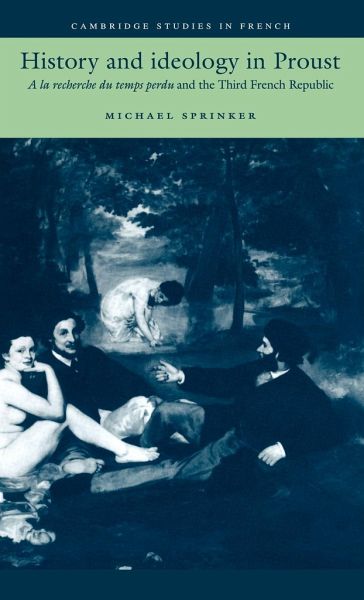
History and Ideology in Proust
Versandkostenfrei!
Versandfertig in 1-2 Wochen
103,99 €
inkl. MwSt.

PAYBACK Punkte
52 °P sammeln!
This critical reinterpretation of Proust's Remembrance of Things Past offers a fresh, socio-historical analysis of the novel. Departing from the more formalist and rhetorical trends in recent Proust criticism, Michael Sprinker draws upon historical scholarship to assess Proust's portrait of French society, and shows that the novel's account of the class structure and rivalries between the landed aristocracy and the bourgeoisie during the first half-century of the Third French Republic was both precise and critically engaged. He argues that in other areas, notably the nature of nationalist sent...
This critical reinterpretation of Proust's Remembrance of Things Past offers a fresh, socio-historical analysis of the novel. Departing from the more formalist and rhetorical trends in recent Proust criticism, Michael Sprinker draws upon historical scholarship to assess Proust's portrait of French society, and shows that the novel's account of the class structure and rivalries between the landed aristocracy and the bourgeoisie during the first half-century of the Third French Republic was both precise and critically engaged. He argues that in other areas, notably the nature of nationalist sentiment and gender ideology, Proust offers insight into phenomena studied only in fragmentary ways in previous historical writing on this crucial period. His study provides an original approach in its combination of history and literature, and is the most thorough work of Marxist criticism on Proust to date.
Table of contents:
Introduction; 1. Base and superstructure; 2. Class and class struggle; 3. Ideology; 4. Revolution; Notes; Index.
This book offers a socio-historical reinterpretation of Proust's Remembrance of Things Past. Breaking with recent trends in Proust criticism, Michael Sprinker draws upon historical scholarship to assess Proust's portrait of French society.
This critical reinterpretation of Proust's Remembrance of Things Past offers a fresh, socio-historical analysis of the novel.
Table of contents:
Introduction; 1. Base and superstructure; 2. Class and class struggle; 3. Ideology; 4. Revolution; Notes; Index.
This book offers a socio-historical reinterpretation of Proust's Remembrance of Things Past. Breaking with recent trends in Proust criticism, Michael Sprinker draws upon historical scholarship to assess Proust's portrait of French society.
This critical reinterpretation of Proust's Remembrance of Things Past offers a fresh, socio-historical analysis of the novel.




